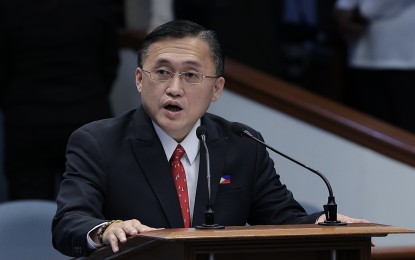
SPECIALTY CENTERS. Senator Christopher Lawrence “Bong” Go sponsors Senate Bill No. 2212, otherwise known as an Act establishing specialty centers in hospitals under the direct supervision and control of the Department of Health Wednesday (May 17, 2023). Go said the proposed measure would mandate the Department of Health (DOH) to establish specialty centers in identified DOH hospitals in every region. (Photo courtesy of Senate PRIB)
MANILA – Senate Bill 2212 or the Regional Specialty Centers Act, one of the priority measures of President Ferdinand R. Marcos Jr., reached the Senate plenary on Wednesday.
Sponsored by Senator Christopher Lawrence Go, Senate Bill 2212 earned support from Senate President Juan Miguel Zubiri, Senators Sonny Angara, JV Ejercito, Ramon Revilla Jr. and Pia Cayetano by co-sponsoring the measure.
In his sponsorship speech, Go said that access to hospitals providing specialized healthcare services, which are mostly located in Metro Manila, is still limited.
He cited the Philippine Heart Center, Lung Center of the Philippines, National Kidney and Transplant Institute and the Philippine Children's Medical Center which are all primary destinations to Filipinos with serious illnesses.
"Marami sa kanila ang namamasahe at pumupunta pa ng Maynila. Dagdag pa sa iisipin nila ang transportation. Problema pa nila kung saan sila tutuloy habang nandito sa Metro Manila. At nandyan din ang mataas na presyo ng mga bilihin kumpara sa kanilang mga probinsya (A lot of them have to pay for transportation. They also have to consider where to stay and the expensive commodities here in Metro Manila compared to their provinces)," Go said.
"We need to make these specialized medical services available to our people in the provinces. We must unburden our people of unnecessary long travels and additional expenses just to get these services," he added.
Go, who chairs the Senate Committee on Health and Demography, noted that Senate Bill 2212 is in line with the pronouncement of Marcos in his first State of the Nation Address wherein he mentioned how Filipinos were able to benefit from these specialty hospitals which should also be brought to other parts of the country.
He also emphasized that the establishment of specialty centers is among the health-related legislative agenda contained in the Philippine Development Plan 2023 to 2028 signed by President Marcos.
"Sumasang-ayon po ako kay Pangulong Marcos. Hindi lang naman sa Metro Manila mayroong may sakit sa puso o baga. Sa pag-iikot ko po sa iba’t ibang parte ng bansa, napakadaming lumalapit sa akin hindi lang para magpagamot, may iba na humihingi po ng pamasahe para lang bumiyahe sa Maynila (I agree with President Marcos. Not only people in Metro Manila have heart or lung diseases. A lot of people in the provinces I visited asked help not only for their treatment, but also for their transportation going to Metro Manila)," Go said.
If passed into law, Senate Bill 2212 will mandate the Department of Health (DOH) to establish specialty centers in identified DOH hospitals in every region to decongest the existing specialty hospitals in Metro Manila.
During the committee hearing, the DOH and the specialty hospitals unanimously agreed to the measure considering that healthcare experts in the regions and other personnel are already available and accessible in the regional hospitals.
Further, Go said the infrastructure and equipment would just have to be upgraded and complemented, as compared to constructing new specialty hospitals.
In 2021, the DOH issued a Department Order designating selected DOH hospitals as specialty centers which currently serves as a guide for the agency and its hospitals.
Go explained that a legislative measure is needed to ensure continuous funding and to guarantee that the establishment of specialty centers in DOH hospitals will be prioritized by the government.
Within five years after the measure is passed into law, the DOH shall establish at least one specialty center in every region, with particular focus on establishing heart, lung, and kidney centers which shall replicate the capabilities of the National Specialty Centers in Metro Manila.
"The criteria for the establishment of specialty centers are also provided such as evidence of the health needs and demands in the catchment population, geographic or physical access to the hospital, role of the DOH hospital as referral for healthcare provider networks, availability of competent health human resources for specialized healthcare; and operational and financial performance of the DOH hospital," Go said.
He said the DOH is also required to include capital outlay investment for designated specialty centers through the Health Facilities Enhancement Program and shall coordinate with the Department of Budget and Management in the development of the staffing pattern and standards for specialty centers.
"An initial budget of more than PHP8.6 billion has been included in the 2023 budget. And through this legislation, Mr. President, we aim to sustain its funding," Go said.
Last month, Marcos confirmed that the government is already identifying areas where specialty hospitals would be established. (PNA)
